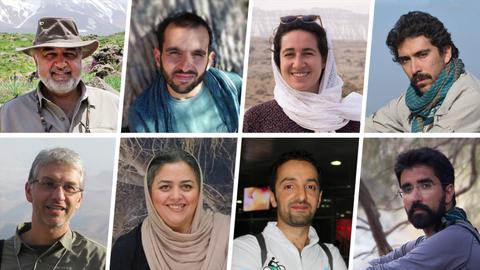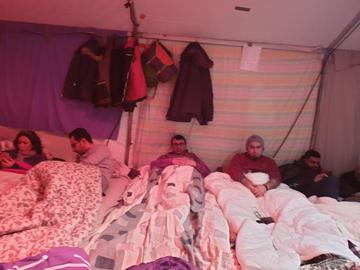An appeals court upheld combined prison sentences of 58 years for eight environmental activists on Tuesday, February 18, 2020. The defendants were not present when the verdict was handed down, and nor were their lawyers.
In announcing the final sentencing, a judiciary spokesman told the activists, who were arrested in February 2018, that they were not eligible to file a further case in the Tehran Province Court of Appeal.
Most of the environmentalists had been informed of their charges in November 2019, again without being present in court.
IranWire spoke with an individual close to the activists about the case. "The families wrote a letter to Zargar, the judge at the appeals court, asking for a fair review, but we knew that the Revolutionary Guards Corps (IRGC) was behind the case and the judge had no power. Honestly, we expected the verdict to be approved. They themselves have taught us during these two years that we should not expect justice or fair scrutiny from the judiciary.”
When asked about the prisoners’ response to the verdict, the source told me: ”Until the news was announced in the media, they were not aware of the results. But televisions are on in prison cells, and they must have heard the news.” The contact then repeated: “We no longer expect justice from the Iranian judiciary."
"In our view, they are charged with acting against [national] security,” said Gholam Hossein Ismaili, a spokesman for the judiciary, at a news conference on February 18 announcing the final verdict.
According to the verdict, six of the activists were charged with "espionage for the US belligerent government" and one with "espionage," and only one, Abdolreza Kouhpayeh, was charged with "congregating and colluding to act against national security.”
The Iranian Students' News Agency reported that Morad Tahbaz was sentenced to 10 years in prison on charges of collaborating with the US government and ordered to hand over funds he received from the US government; Niloufar Bayani, held on charges of collaborating with the US government, was sentenced to 10 years in prison and ordered to repay funds; Hooman Jokar and Taher Ghadirian were sentenced to eight years in prison, and Sam Rajabi and Sepideh Kashani were sentenced to six years in prison, for collaborating with the US government; Amir Hossein Khaleghi was charged with espionage and sentenced to six years in prison and Abdolreza Kuhpayeh was sentenced to four years' imprisonment by the Revolutionary Court on charges of congregating and colluding to act against national security. The sentences were wholly upheld in the appeals court.
Seven environmental activists have been convicted of cooperating with the “hostile” US government. But according to an official document issued by the US State Department on December 14, 2013, Iran has designated no country other than Israel as “hostile" to or the "enemy" of the Islamic Republic.
Nevertheless, Judge Abolqasem Salavati, the judge ruling on the eight environmental activists' case, handed down sentences in line with charges of collaborating with what was described as the hostile US government.
Recent Events to Justify Ruling
Rouhollah Zam, director of the Amad News Telegram Channel, defended himself in his second court hearing on February 16, also against charges of alleged cooperation with the US government. He also argued that the United States was not considered to be a hostile state and that he did not accept the allegations. But Judge Salavati brought in recent events to justify his ruling. "On Trump's orders, our dear commander [Ghasem Soleimani] was martyred by the terrorist and hostile US government. Does not the US Congress allocate a budget to fight against our system?”
However, Iranian law does not stipulate such a definition, and there is no legal criteria to back up the statement.
The preliminary injunctions of the environmental activists were issued by branch 15 of the Revolutionary Court on November 20, 2019.
Since their arrest in February 2018, the facts and evidence of the espionage charges brought against the activists have not been defined or outlined. The IRGC’s intelligence unit, which is in charge of their detention, has not yet commented on the case.
The espionage claim lodged by judicial authorities concerned the environmental activists’ use of 50-meter security cameras. However, Issa Kalantari, head of the Department of Environment, said on February 14, 2018: "These cameras are for observing and monitoring cheetahs and their field of vision is not more than 50 meters. The maximum range of these cameras is 50 meters.”
On May 8, 2018, Member of Parliament Mahmoud Sadeghi quoted a statement by the Ministry of Intelligence on Twitter. The post said that a member of the president’s committee dealing with the issue of the environmental activists "explicitly and reasonably found no evidence for their spying allegations."
Issa Kalantari agreed, stating on May 23, 2018 that the environmental activists were not linked to any acts of espionage, and also pointing to the cabinet’s four-member committee that was handling the matter. He said the detained activists should be released as there was no evidence to substantiate the accusations made against them.
The eight activists have been held at Evin Prison since February 2019 and have mainly been held in solitary confinement. Recently, they were transferred to wards for ordinary prisoners, and not wards reserved for political prisoners.
After their arrest, the families of the eight environmental activists wrote to the heads of the three branches of power — the president, the speaker of the parliament, and the head of the judiciary — as well as to the Supreme Leader, demanding justice for them. The families have repeatedly met with members of parliament to urge them to follow up on the situation. However, this week’s appeals verdict is in line with other cases overseen by IRGC intelligence.
Kavous Seyed-Emami, a sociology professor, faculty member at Imam Sadegh University, and chief executive of the Persian Heritage Wildlife Institute, was arrested along with the eight environmental activists in February 2018. A few days later, on February 8, prison authorities announced that Seyed-Emami had "committed suicide" in his cell and had died, a matter which has always been denied by his family and relatives.
Related Coverage:
Six Environmentalists Given Long Prison Sentences
visit the accountability section
In this section of Iran Wire, you can contact the officials and launch your campaign for various problems

























comments